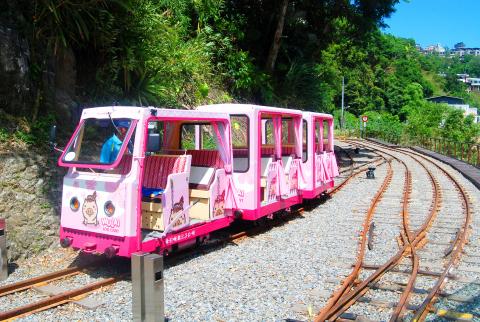A 90-year-old railway in New Taipei City’s Wulai District (烏來) was reopened yesterday after nearly two years of reconstruction following Typhoon Soudelor.
The train’s three carriages transport passengers 1.5km between Wulai Station and Waterfall Station.
There will be a discounted fare of NT$30 until the end of next month.

Photo: Chang An-chiao, Taipei Times
The railway is a landmark of the district along with Wulai Waterfall, Lansheng Bridge and Neidong National Forest Recreation Park, Premier Lin Chuan (林全) said at the reopening ceremony, adding that the area has the potential to become an international tourist attraction.
The originally hand-pulled railway was built in 1928 during the Japanese colonial period to transport logs, tea and passengers, Forestry Bureau Director-General Lin Hua-ching (林華慶) said.
“After the highway was completed in 1951, most sections of the railway were demolished except for the 1.5km portion,” he said.
Typhoon Soudelor in August 2015 caused serious damage to the remaining portion of the railway, 120m of which completely collapsed, he said.
“Much of the reconstruction work was done by hand as big machines could not operate on the narrow roads,” he said, adding that the work was finished last month.
Chu Hung-chi (朱鴻基), who used to pull the carts as a teenager, gave many photographs to a museum by Wulai Station.
Chu said that in the 1960s, he met many tourists from the US who would give him enough tips in a single day to purchase a bag of rice.
His two grandsons said they were glad to see the railway reopen, but expressed hope that the Aboriginal Atayal people’s culture could be featured more in local tourism.
The railway closure dealt a blow to local businesses, a cafe shopkeeper surnamed Lin (林) said, adding that their cafe only barely stayed afloat thanks to some regulars and bicyclists.
“When the typhoon struck, our houses were washed over by mudslides because the bureau did not properly maintain fortifications on the slope,” Lin said, adding that they were still negotiating compensation with bureau officials.

Taiwan is stepping up plans to create self-sufficient supply chains for combat drones and increase foreign orders from the US to counter China’s numerical superiority, a defense official said on Saturday. Commenting on condition of anonymity, the official said the nation’s armed forces are in agreement with US Admiral Samuel Paparo’s assessment that Taiwan’s military must be prepared to turn the nation’s waters into a “hellscape” for the Chinese People’s Liberation Army (PLA). Paparo, the commander of the US Indo-Pacific Command, reiterated the concept during a Congressional hearing in Washington on Wednesday. He first coined the term in a security conference last

Prosecutors today declined to say who was questioned regarding alleged forgery on petitions to recall Democratic Progressive Party (DPP) legislators, after Chinese-language media earlier reported that members of the Chinese Nationalist Party (KMT) Youth League were brought in for questioning. The Ministry of Justice Investigation Bureau confirmed that two people had been questioned, but did not disclose any further information about the ongoing investigation. KMT Youth League members Lee Hsiao-liang (李孝亮) and Liu Szu-yin (劉思吟) — who are leading the effort to recall DPP caucus chief executive Rosalia Wu (吳思瑤) and Legislator Wu Pei-yi (吳沛憶) — both posted on Facebook saying: “I

Sung Chien-liang (宋建樑), who led efforts to recall Democratic Progressive Party (DPP) Legislator Lee Kun-cheng (李坤城), was released on bail of NT$80,000 today amid outcry over his decision to wear a Nazi armband to questioning the night before. Sung arrived at the New Taipei District Prosecutors’ Office for questioning in a recall petition forgery case last night wearing a red armband bearing a swastika, carrying a copy of Adolf Hitler’s Mein Kampf and giving a Nazi salute. Sung left the building at 1:15am without the armband and covering the book with his coat. Lee said today that this is a serious

A mountain blaze that broke out yesterday morning in Yangmingshan National Park was put out after five hours, following multi agency efforts involving dozens of fire trucks and helicopter water drops. The fire might have been sparked by an air quality sensor operated by the National Center for High-Performance Computing, one of the national-level laboratories under the National Applied Research Laboratories, Yangmingshan National Park Headquarters said. The Taipei City Fire Department said the fire, which broke out at about 11am yesterday near the mountainous Xiaoyoukeng (小油坑) Recreation Area was extinguished at 4:32pm. It had initially dispatched 72 personnel in four command vehicles, 16